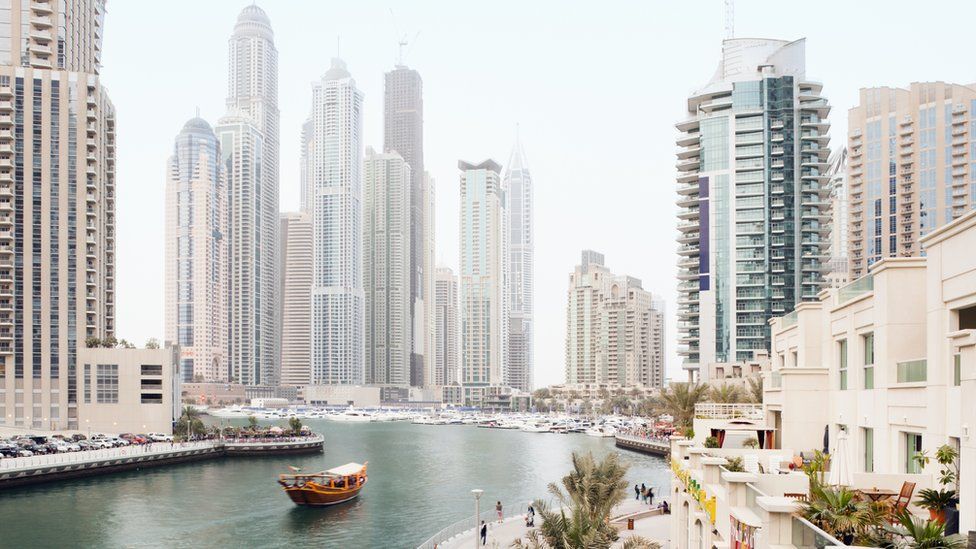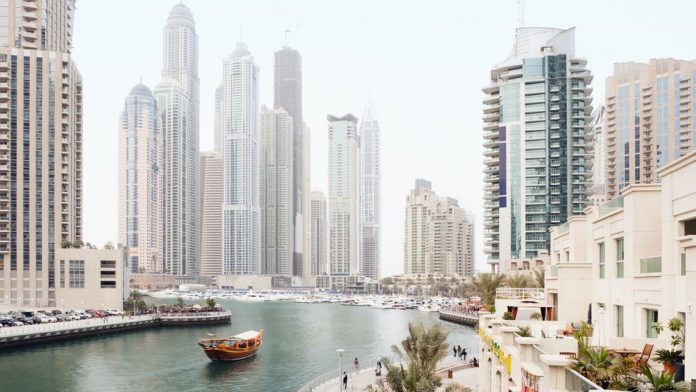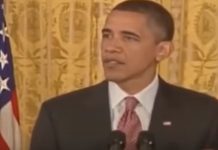Dubai has emerged as a haven for wealthy Russians fleeing the impact of western sanctions over the war in Ukraine.
Russian billionaires and entrepreneurs have been arriving in the United Arab Emirates (UAE) in unprecedented numbers, business leaders told the BBC.
Property purchases in Dubai by Russians surged by 67% in the first three months of 2022, a report said.
The UAE has not put sanctions on Russia or criticised its invasion of Ukraine.
It is also providing visas to non-sanctioned Russians while many Western countries have restricted them.
It is estimated that hundreds of thousands of people have left Russia over the last two months – although exact figures are not available.
One Russian economist said as many as 200,000 Russians had left in the first 10 days after the war began.
Virtuzone, which helps companies to set up operations in Dubai, has seen a huge surge of Russian clients.
“We are receiving five times more enquiries from Russians since the war began,” said chief executive George Hojeige.
“They are worried about an economic meltdown that’s coming. That is why they are moving here to secure their wealth,” he added.
The influx of Russian nationals has bolstered demand for luxury villas and apartments across the city. Real estate agents are reporting a surge in property prices, as Russians arriving in Dubai are looking to purchase homes.
Dubai-based real estate agency Betterhomes found property purchases by Russians surged by two thirds in the first three months of 2022.
And another real estate agency, Modern Living, told the BBC it had hired many Russian-speaking agents to cater to rising demand. Chief executive Thiago Caldas said they were receiving numerous calls from Russian nationals looking to relocate to Dubai immediately.
“Russians who are coming down are not buying just for investment, they are looking at Dubai as a second home,” he said.
 IMAGE SOURCE,GETTY IMAGES
IMAGE SOURCE,GETTY IMAGES‘Brain drain’
Many multinational companies and Russian start-ups are also relocating their employees to the UAE.
Fuad Fatullev is the co-founder of WeWay – a blockchain technology company that had offices in Russia and Ukraine. After the war broke out, he and his partners shifted hundreds of employees to Dubai.
“The war had a massive impact on our operations. We couldn’t continue [as we were] as we had to move hundreds of people outside of Ukraine and Russia,” says Fuad, who is a Russian citizen.
He adds that they chose to shift their employees to the UAE as it offers a safe economic and political environment to operate a business.
He said Russian businesses were moving out as they were finding it incredibly difficult to operate due to sanctions. The challenge was even more acute for companies dealing with international clients and brands, as most western firms have severed ties with Russian-based enterprises, he said.
Global firms like Goldman Sachs, JP Morgan and Google that have shut down offices in Russia, are also relocating some of their employees to Dubai.
“There is definitely a brain drain that is happening. A lot of people are leaving because there are a lot of business restrictions right now,” says Mr Fatulley.
Real estate prices soar
Russia’s central bank is barred from tapping into the billions of foreign reserves held overseas in foreign banks. Some Russian banks have been removed from the Swift financial messaging system.
To protect its reserves, the Russian government has enacted capital restrictions and banned citizens from exiting the country with more than $10,000 in foreign currency.
Finding it difficult to transfer cash, a lot of Russian buyers are making payments in cryptocurrencies. Some of the purchasers have an intermediary who will take the payment in crypto and then pass on the cash to the seller on behalf of the buyer.
Gulf states including the UAE and Saudi Arabia have rejected calls from western governments to impose sanctions on Russia.
Abu Dhabi was one of only three countries, along with China and India, to abstain in a United Nations Security Council vote in February to condemn Russia’s invasion of Ukraine. It also abstained in a General Assembly vote on 7 April to suspend Russia from the UN Human Rights Council.
‘Brain drain’
Many multinational companies and Russian start-ups are also relocating their employees to the UAE.
Fuad Fatullev is the co-founder of WeWay – a blockchain technology company that had offices in Russia and Ukraine. After the war broke out, he and his partners shifted hundreds of employees to Dubai.
“The war had a massive impact on our operations. We couldn’t continue [as we were] as we had to move hundreds of people outside of Ukraine and Russia,” says Fuad, who is a Russian citizen.
He adds that they chose to shift their employees to the UAE as it offers a safe economic and political environment to operate a business.
He said Russian businesses were moving out as they were finding it incredibly difficult to operate due to sanctions. The challenge was even more acute for companies dealing with international clients and brands, as most western firms have severed ties with Russian-based enterprises, he said.
Global firms like Goldman Sachs, JP Morgan and Google that have shut down offices in Russia, are also relocating some of their employees to Dubai.
“There is definitely a brain drain that is happening. A lot of people are leaving because there are a lot of business restrictions right now,” says Mr Fatulley.
Real estate prices soar
Russia’s central bank is barred from tapping into the billions of foreign reserves held overseas in foreign banks. Some Russian banks have been removed from the Swift financial messaging system.
To protect its reserves, the Russian government has enacted capital restrictions and banned citizens from exiting the country with more than $10,000 in foreign currency.
Finding it difficult to transfer cash, a lot of Russian buyers are making payments in cryptocurrencies. Some of the purchasers have an intermediary who will take the payment in crypto and then pass on the cash to the seller on behalf of the buyer.
Gulf states including the UAE and Saudi Arabia have rejected calls from western governments to impose sanctions on Russia.
Abu Dhabi was one of only three countries, along with China and India, to abstain in a United Nations Security Council vote in February to condemn Russia’s invasion of Ukraine. It also abstained in a General Assembly vote on 7 April to suspend Russia from the UN Human Rights Council.
The rise in Russian investment comes just months after the UAE was placed on a “grey list” by the Financial Action Task Force (FAFT), a global financial crime watchdog.
It means the country faces increased monitoring of its efforts to counter money laundering and terrorist financing. The UAE government has claimed to have taken significant measures to regulate inbound investment, and has stated that it remains committed to working closely with FAFT on areas for improvement.





















